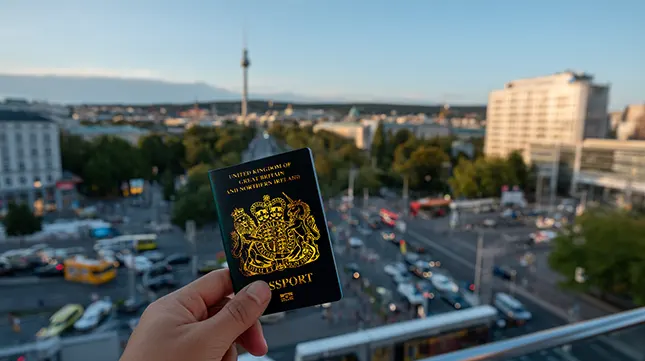Thinking of moving to Germany from the UK in 2025? You’re onto something big.
Germany remains one of Europe’s strongest economies, with outstanding infrastructure, living standards, and a stable job market.
Thanks to sweeping immigration reforms like the 2023 Skilled Workers Act, Germany is welcoming skilled professionals, students, and family members with far more flexibility than ever before (offering reduced salary thresholds, faster degree recognition, and new “opportunity” job‑seeker visas).
Cities like Berlin, Frankfurt, and Munich continue to attract expats with their vibrant culture, solid public services, and efficient transportation.
Plus, a landmark 2025 bilateral treaty is reintroducing UK passport holders to e‑gate access in Germany, meaning faster, frictionless entry for frequent travellers by October 2025.
If you’re craving opportunity, quality of life, and smoother access, it’s all happening in Germany right now.
Visiting? Great. Staying? You’ll Need a Visa”

Here’s the deal: UK citizens can still visit Germany visa‑free for up to 90 days in any 180‑day window under Schengen rules.
For those planning to settle in, work, or study beyond that, get ready for paperwork because you will need to apply for a long-term visa.
You’ll need a long‑stay or D visa, which spans work, study, family, or job‑search paths.
Take a look at TerraTern, they have produced a very informative guide to applying for an extended stay visa.
Looking ahead, there are some very positive changes afoot.
Germany’s new Entry/Exit System (EES) goes live on October 12, 2025, replacing passport stamps with biometric scanning (fingerprints and photos) and enhancing the digital verification of travellers’ documentation.
Later, the ETIAS travel authorisation system, similar to the EU’s ESTA, will begin operating in late 2026, requiring UK visitors under visa-free rules to apply online (including a €20 fee, valid for three years).
If you’re moving permanently, these don’t apply, but tourists and short‑term visitors, take notes now.
Which Visa Works for You in 2025
Here is a breakdown so that you can see at a glance which visa applies to your personal situation:
- Skilled Worker & EU Blue Card: With Germany’s 2023 reforms, it’s easier to qualify, plus lower salary thresholds and quicker processing are now the norm.
- Opportunity (Job‑Seeker) Visa: No job offers? No problem. In Germany, qualified individuals can hunt for a year, essentially serving as a “chance” card, especially if they hold a degree or vocational credential.
- Family Reunification Visa: Joining a spouse or parent already living in Germany? You’ll need basic German skills and documents like marriage or birth certificates, but the process is more streamlined now.
- Freelancer or Self‑Employed: If you fall into the arts, engineering, IT, or related creative/professional fields, a freelancing visa could work, but you’ll need a solid business plan, proof of funds, and to show your work benefits.
2025 is, frankly, the right moment to pick the route that fits your vibe, and Germany made sure they’ve smoothed the path for you.
For more help and guidance, visit the German Immigration Advice Service website.
Where to Live, What to Expect & What It Costs

Looking for a new place to live poses a conundrum. Where? What will it cost? How do you find a property in Germany? How do you rent a home in Germany?
So many questions, here is a basic guide that explains what new arrivals need to know:
- Where to live: The correct location can quite literally make or break your stay so choose wisely. Munich, Düsseldorf, Stuttgart, and Nuremberg are among the safest cities in Germany. Popular expat hubs include Aachen, Düsseldorf, Hamburg, and Frankfurt.
- Practical first steps: Before you move permanently, take time to visit several times. Scout vibrant neighbourhoods, join local expat forums for insider tips, and budget carefully for rent, utilities, and basics during your first months.
- Cost of living: Across the board, Germany tends to be a bit cheaper than the UK. Numbeo data is a great help and has shown that consumer prices are slightly lower, though rents in the UK might still edge higher. But major cities, especially Munich, still come with a London‑style price tag.
- Renting a Home: Few expats choose to buy a home, most opt to rent. The procedure is not complicated, but it certainly is different compared to the UK. To ensure you are aware of what needs to be done, check out this step by step guide to renting in Germany.
Germany’s Impressive Education System

Germany’s education system isn’t just good; it’s one of the world’s most structured and respected.
Public schools, free and accessible across states, form the backbone of a system that balances academic excellence with practical learning.
From Gymnasium (college-prep) to Realschule (technical secondary) and Hauptschule (vocational), Germany’s tiered approach ensures students are steered into the best-fit path early on.
The country also shines in dual vocational training, where apprenticeships and vocational education merge to create job-ready talent. It’s why Germany enjoys one of the EU’s lowest youth unemployment rates.
Don’t assume private is always better; public schools deliver elite standards without tuition fees. And if you’re after international credentials, schools offering the International Baccalaureate (IB) or International Primary Curriculum (IPC) are widely available and globally recognised.
Check out the Make-It-in-Germany school guide for a breakdown based on official policy.
Healthcare in Germany: Quality Coverage That’s Mandatory

If you’re moving to Germany, robust health care isn’t a bonus; it’s non-negotiable.
All residents are required to have health insurance, which is your VIP ticket to residency, work permits, and peace of mind.
Most people opt for the public system (Gesetzliche Krankenversicherung – GKV), which is often provided by your employer and even covers dependents at no additional cost.
If you’re self-employed, high-earning, or want fancier coverage, the private Krankenversicherung (PKV) offers more options at higher rates.
For a thorough walkthrough, consider visa and insurance options—don’t miss the ‘Health Insurance and Healthcare in Germany Explained’ guide.
Bottom line: sort insurance early, or you won’t get anywhere, and you’ll kick yourself if something goes south.
Speak German – Language Is Your Key
English helps you survive in Germany, but German lets you thrive.
While major cities and workplaces are English-friendly, mastering German improves your job prospects, social connections, and daily life significantly.
There’s no substitute for being able to chat confidently with your doctor, landlord, or colleagues, plus, Germans genuinely appreciate the effort.
Language immersion programs, local integration classes, or online courses are all viable paths.
And let’s be honest, your aim is to feel at home instead of just getting by, so start learning German yesterday. It’s the difference between ‘just living’ and ‘actually belonging.’
Banking in Germany: Easy to Set Up

Opening a bank account in Germany is surprisingly easy, but smart moves only come if you grill the details.
You’ll need your passport, your Anmeldung (that’s your official residency registration), and possibly, but not always, proof of employment or income.
Once that’s in hand, most local banks let you set up basic accounts, some mobile-only options included.
But don’t sign up blindly, just like the UK, compare account fees, online tools, German to English support, and benefits like fee-free international transfers and multi-currency capabilities.
Once you’ve landed that Euro account, paying rent, getting paid, and living like a local becomes friction-free.
Here’s a pro tip: mobile banks and online-only accounts are increasingly expat-savvy, perfect if you don’t yet have a permanent footprint.
Take a Dive into German Cuisine

Trust me, the best way to learn German is through your stomach.
German cuisine goes way beyond bratwurst and sauerkraut, though those are delicious, of course!
Think fluffy pretzels, hearty stews (Eintopf), pretzel-soft cheeses, and sweet treats like Black Forest cake or apple strudel.
Every region brings its own twist, Bavaria’s weisswurst, Rhineland’s hearty meats, or Berlin’s modern fusion.
Markets brim with local cheeses, seasonal berries, and speciality meats, grab, taste, repeat.
Eating is exploring. So be bold: hit farmers’ markets, try kafès, street food, bakeries, and regional specialities.
That culinary curiosity doesn’t just fill your belly, it helps you bond with neighbours, anchor your experience, and fall in love with your new home, one bite at a time.
Taxes in Germany: Know What You Owe, and Stay Smart
Germany’s tax system covers income, VAT, property, and more. While navigating it may feel complex, the key is clarity.
Start with income tax brackets, which slide from 14% to 45%, depending on your earnings.
Then there’s solidarity surcharges, church tax (if you’re registered), VAT, and local fees, nothing sneaks up on you if you’re informed.
Use expat tax calculators to compare what you’ll pay versus the UK and figure out deductions like childcare or work-related costs.
If you’re juggling employment, freelancing, or rental income, get professional advice.
Germany loves compliance, but if you’re smart, you stay clear of issues and keep more of what you earn.
Moving to Germany from the UK with R.H. Pardy Removals

Lastly, at some point, you will need to arrange for your personal effects to be sent to your new home in Germany.
While moving your stuff to Germany post-Brexit isn’t a nightmare, it is better to have help from those who know how to do it professionally.
A strong removals company (like R.H. Pardy) handles customs, paperwork and transport so you don’t get hit with surprise duties or stuck in red tape.
When it comes to relocating to Germany, experience matters, and R.H. Pardy Moving & Storage Limited has been helping individuals, couples, and families make the leap across Europe and beyond for decades.
From careful, professional packing to navigating complex customs export documentation, our friendly, knowledgeable team is with you every step of the way.
As a proud member of the British Association of Removers (BAR), you can be sure your move meets the highest industry standards for safety, reliability, and customer care.
To find out more about our removals to Germany services, call us today on 01202 499 390 or complete our quick online contact form.
One of our experts will be happy to answer your questions and help you start moving to Germany from the UK, stress-free and on schedule.




